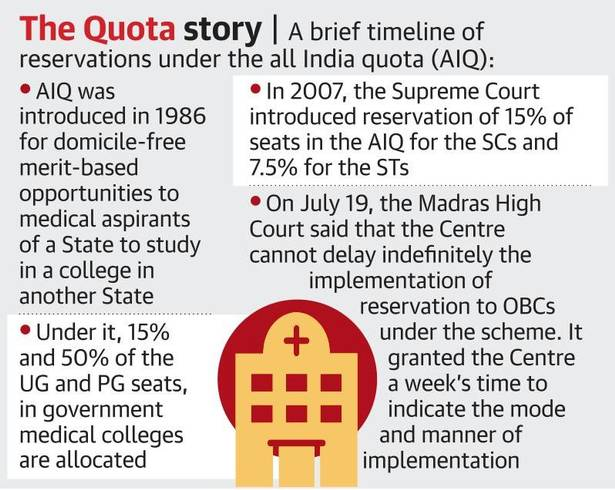NEET’s All India Quota | 30 Jul 2021
Why in News
Recently, the Union Health Ministry has announced 27% reservation for the Other Backward Classes (OBCs) and 10% quota for the Economically Weaker Sections (EWS) in the All India Quota (AIQ) scheme for undergraduate (UG) and postgraduate (PG) medical/dental courses from 2021-22 onwards.
Key Points
- About All India Quota (AIQ) Scheme:
- The AIQ was introduced in 1986 under the directions of the Supreme Court (SC) to provide for domicile-free merit-based opportunities to students from any State to aspire to study in a medical college located in another State.
- It comprises 15% of UG seats and 50% of PG seats in government medical colleges.
- Remaining chunk of the seats in state medical/dental colleges is reserved for students domiciled in their respective states.
- In January, 2007, in Abhay Nath v University of Delhi and Others, the SC directed that reservation of 15% for Scheduled Castes and 7.5% for Scheduled Tribes be introduced in the AIQ.
- Until 2007, no reservation was implemented within the All India Quota for medical admission.
- When the Central Educational Institutions (Reservation in Admission) Act became effective in 2007, providing for uniform 27% reservation to the OBCs, the scheme was implemented in all the Central Educational Institutions.
- However, this was not extended to the AIQ seats of State medical and dental colleges.
- The 10% EWS quota under the Constitution (One Hundred And Third Amendment) Act, 2019, too, has been implemented in central educational Institutions, but not in the National Eligibility-cum-Entrance Test (NEET) AIQ for state institutions.
- Now, after this decision, the Reservation for the OBC and EWS categories within the AIQ will be offered in medical colleges from the current academic year.
- This decision will help thousands of students under the given categories.
- The AIQ was introduced in 1986 under the directions of the Supreme Court (SC) to provide for domicile-free merit-based opportunities to students from any State to aspire to study in a medical college located in another State.
- About NEET:
- The National Eligibility-cum-Entrance Test (NEET) is the entrance examination for entry to all undergraduate and postgraduate medical and dental courses in the country.
- Until 2016, the All India Pre-Medical Test (AIPMT) was the national-level entrance examination for medical colleges.
- While state governments used to hold separate entrance tests for seats that were not contested at an all-India level.
- In 2016, the Supreme Court upheld the newly inserted section 10-D of the Indian Medical Council Act, 1956 which provides for a uniform entrance examination to all medical educational institutions at undergraduate level and postgraduate level in Hindi, English and various other languages.
- Now, the Indian Medical Council Act, 1956 stands repealed after it has been replaced by the National Medical Commission Act, 2019 that came into existence on 8th August 2019.
- It is conducted by the National Testing Agency (NTA).

